|
Business Places: Hakel's Restaurant and Truck Stop, Cejka Repair, Wonka Oil and Feed Company, Bill Semrad Body and Paint, Stuchlik Insurance Agency, Bachand Grain Elevator Company, The Loft, Weston Co-operative Credit Association, Pondarosa Bar, Weston Market, Otto Cerny Body and Paint Shop, Weston Lumber and Building Center, and Donald Jansa and Son, Hauling and Gravel.
As some mellow with age, Weston still progresses -- with railroad, telephone, electricity, automobiles, town and farm equipment, and other modern facilities, such as radio and television.
May Weston continue to prosper. Written by - Virginia A. Pokorny
JOSEPH B. BARTEK
FARMSTEAD
In 1894, Joseph B. Bartek, a prominent farmer of Chapman Precinct and former Saunders County Sheriff, added to an existing 16 by 32-foot house on his farm. The house became a 5-level building, 36 by 32 feet in size.
The first floor contained five rooms. The upstairs had 6 bedrooms with 2 big closets. There was also a huge attic. There were colored-glass windows in the bay windows and in the attic, with big balloon lightning rods on the roof. In the 1930's Henry Bartek added a wind charger to the roof to put power into a storage battery used to power a radio.
A stone wall cellar contained shelves for fruit jars, a corner for potatoes, and 10, 15, and 20-gallon stone jars for pickles, sauerkraut, and wine-making in another corner. A cyclone cellar, down the stairs from the regular cellar, was used for keeping cold the milk, yeast, and hams. It also provided safety from storms. Hence, the five levels.
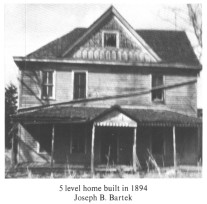 |
5 level home built in 1894
Joseph B. Bartek |
In 1894, Joseph built a 2-story split-level horse barn. The large limestone basement held 16 horses. In the southeast corner was a harness shed with room for the horse collars, harnesses, and fly nets. Each harness set was hung on its own big hook. The machinery shop and workshop, and granary were entered from the east side. In the granary the corn was ground by an old water and steam engine. Later, a 1½-horsepower engine ground the corn. There was a shaft in the ceiling of the basement by which the horses could be fed corn and oats. Hay in the hay loft on the top floor could be slid into the basement for the horses.
A large pigeon closet was built between the floors. Pigeons were one source of meat for the Bartek family. A log cabin was built in 1876 and a corn crib was added in 1887 by Joseph's father, John. Also found on the farm was a 40-foot windmill and a big, cement water tank for the horses, pigs, and calves. A large cottonwood with a diameter of 8.8 feet can still be found on the farm. The tree is at least a hundred years old.
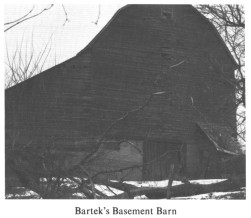 |
| Bartek's Basement Barn |
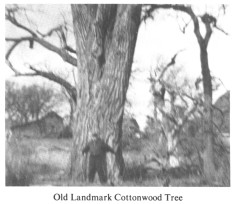 |
| Old Landmark Cottonwood Tree |
Henry Bartek, son of Joseph B. Bartek, lived on this farm, as a child, and also with his wife, Josie and daughters, Eleanor and Sophie, until 1944 when he moved to Wahoo. The house, located 5½ miles southwest of Weston, though empty, still stands as a tribute to the Bartek family's ingenuity and contribution to the early history of Saunders County.
WONKA OIL AND FEED CO.
John Wonka went into trucking business in 1925. In 1933, he built a filling station. Later, he started a poultry and eggs and feed business. He sold Gooch feeds for many years.
In 1944, John and his wife, Alice, applied for a Liquor License. In 1970, they retired and their son, George, and his wife, Laverne, took over the business. They built a new feed store in 1969. They now sell Master Mix Feeds. In 1980, they built a new Liquor Store. At the present time George is Mayor of City of Weston.
WESTON PRESBYTERIAN
CHURCH 'KOSTEL NADEJE'
'CHURCH OF HOPE'
The present edifice was built in about 1889 and used for worship by the Methodist Episcopals. The property, lots 16, 17, 18,19, and 20, in block 6, in Maucks first addition of east Weston, Nebr., was purchased from Jacob and Ann Mauck for $150.00. Captain Davis, a relative of the Maucks, donated the church bell, which hangs in the church belfry. The mother of Clyde and Claude Worrall of Wahoo, was a daughter of Jacob and Ann Mauck. The members of the Methodist Episcopals Board were Jonathan Edwards, Charles Hadsell, Jacob Mauck and John Campbell at the time of this transaction.
By 1890, the congregation was having difficulties in meeting expenses and applied for aid of $250.00 from the Board of Church Extension of the Methodist Episcopal Church. For collateral, it was insured for $1000.00. By 1920, the membership had dwindled or moved away and worship services no longer were held. In the meantime, a group called the 'Reformed Czech Congregation' had been sharing a nearby Baptist Church and having worship services on Sunday afternoons in their building, saw the possibility of owning their own House of Worship. On October 8, 1920, the Methodists were authorized to sell their church building. The presiding Methodist Minister at this time was Rev. E. L Hobbe and the trustees were, chairman W. F. Placek, John R. Campbell, Charles A. Tindell, F. E. Way, Mary E. Madigan and Emma M. Samek. The
proceeds of the sale went to the Wahoo Methodist
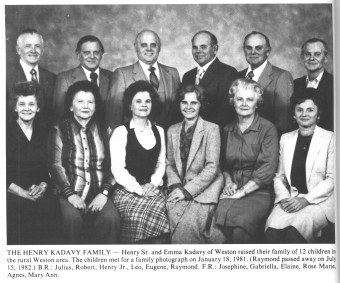 |
| THE HENRY KADAVY FAMILY - Henry Sr. and Emma Kadavy of Weston raised their family of 12 children in the rural Weston area. The children met for a family photograph on January 18, 1981. (Raymond passed away on July 15, 1982.) B.R.: Julius, Robert, Henry Jr., Leo, Eugene, Raymond. F.R.: Josephine, Gabriella, Elaine, Rose Marie, Agnes, Mary Ann. |
page 60
Church. The Czechs joyfully purchased the building and its furnishings for $1500.00 and immediately named it 'KOSTEL NADEJE' or "CHURCH OF HOPE.' In later years it was known as the Weston Presbyterian Church. The trustees of the newly formed church were Joseph T. Cejka, Frank Cejka, Joseph Kubalek, Frank Milacek and George Buresh. They were guided in this transaction by Rev. Jerry Kucera. Rev. Benjamin Paroulek ministered to the people next. At this time the congregation was in the Central West Presbytery which was organized in 1910 to provide needed fellowship for the Czech speaking Presbyterian Churches in the Midwest. Rev. Paroulek served the church until May 7, 1933, Rev. Benjamin Marek succeeded him and served until 1948. From that time to the time of the closing of its doors, Grace Bible Institute of Omaha supplied the pulpit with student ministers. When the Sunday afternoon services were conducted, the custom was men sat on the right side or south, and the women on the left or the north. The children sat in middle front. Sunday school was in the Czech language and the Golden Text 'zlaty text' (memory verse) was learned by each youngster in Czech. 'Ceska Skola' or Czech language school was taught for six weeks during the summer on Saturday afternoons by the minister. The Christmas program by the Sunday School was an annual event on December23, open to the public. In March, 1953, the Ladies Aid was organized under the direction of Pastor Kenneth Swain and his wife. Mrs. Joseph (AGNES) Kubalek was the first president. During this time many changes and improvements have taken place. The wood and coal burning pot-bellied stove was replaced with an oil burning furnace. Then the window screens were installed. In 1955 the members of the congregation diligently removed the dark varnish from all the wood work and pews and refinished them to its
present shade. In 1963, the lighting was improved with the installation of new light fixtures. The clear glass window panes had previously been papered with Cathedral effect paper and now were replaced with stained glass in 1966. In 1968, the whole interior was paneled to eliminate the task of papering; in 1970, the floor was refinished with new tile and also carpeting for the aisles and stage. In the latter 70's the membership had dwindled and the last worship services were held on May 8, 1977. Ruling elders were Adrian Havelka, John Cejka and Paul Cejka. Trustees were Daniel Havelka, Floyd Hudkins and George Cejka. Secretary was Mrs. Floyd (Virginia) Hudkins and Treasurer was William Kliment.
On September 7, 1980, the remaining members of the congregation met at 2:30 P.M., and unanimously voted to donate their church building and its contents to the Historical Society of Wahoo, Nebraska. And so on a Wednesday in November of 1981, the Weston Presbyterian church was moved by Scribbs movers of David City, Nebr., down Highway 92 west of Wahoo after a detour by country roads, to first and Laurel streets and to its final foundation, prepared in advance, at Wahoo Historical Museum site. by Clara Veskrna and Charlotte Sousek
CZECH UNITED PRESBYTERIAN
CHURCH
The Cesko-Moravsky Reformavany Evanjelicky Spolek, (The Czech-Moravian Reformed Evangelical Society), presently known as the Czech United Presbyterian Church, was organized on January 8, 1882. Apparently this religious organization first became incorporated on April 23, 1887, at a meeting held at the Odell schoolhouse located four miles west and one-half mile south of Wahoo, Nebraska
Several Czech Protestant families arrived in this part of Nebraska and settled around Wahoo and Weston. First to arrive in 1875 were Josef Pestal, Tomas and Josef Trutna, Frantisek Pokorny, Josef Caha (Krisdorf), Josef Pallas (Tasov), and Josef Caha (Roznatin) -- all from Moravia. Later, two families came from Bohemia, Josef Cejka (Caslov) and Josef Kliment (Pilemnice). Others were: Josef Pokorny and Matej Jasa (Horni Velimovice), Vaclav Jasa (Povoucov), Vaclav Pallas, Vaclav Svoboda (Chelin), Jan Pokorny (Strizov), Vaclav Pokorny (Pocoucov), Josef Veskrna (Budikovice), Josef Sklenar (Vanec), Karel Smolik (Okrisky). In 1888, another group coming to the Wahoo Czech Church were Vaclav Brich, F. Krafka, Fr. Benes, Josef Svoboda, F. Hledik, A. Trutna, Jan Houfek, Vaclav Svoboda, Vaclav Buch, Jan Trutna, Josef Valts, Josef Novak, Frantisek Kolar, and Josef Krafka.
The history of this church is not just the words taken from old record books, but it is the indomitable spirit of these Czech people who came to this land to make a better life for themselves. They were lonely for family left behind and they missed their homeland and their way of life and longed for the Word of God. There have been so many lives touched by this church because of the sacrifices made by these early pioneers. They were determined, industrious, religious people who were torch bearers of a Reformed Evangelical faith that had deep rooted cleavages in the heritages of the Motherland. The life of Jan Hus, with the sacrificial premise to seek and hold the truth, had been and will continue to be, a great source of inspiration to these Czech people. The basic theology of this outstanding early reformer, with his firm belief in the freedom of thought in accordance with the teachings of Christ as they are recorded in the New Testament, was the basic premise of these immigrants from Moravia and Bohemia.
Many years before the first church was built, they worshipped God on Sundays in their homes. At times, several families would gather in one of their homes to read sermons, have prayers and sing Gospel songs. Most families brought their Bibles, songbooks called "Koncional," a book of sermons called "Postilla," a prayer book and a book called "Funebralek," which had sermons for funerals and burial services. There were times when services were conducted by an itinerant minister. Occasionally, some of the families, with the assistance of an interpreter, worshipped in the Presbyterian Church in Wahoo.
In May, 1879 forty acres of land was purchased, part of which was used as a cemetery.
On Nov.11, 1888 the first church was built on land acquired through the generosity of Antonin Trutna and Josef Pestal. On January 2, 1898 the congregation voted to build a manse. This house was used for pastors and their families until 1967 when the present manse was built. On March 11, 1929 the present church was dedicated. In 1952 the Ladies Aid Society was organized. In 1953 the Mariners service group was organized. On August 15, 1982 the church held its Centennial Celebration, with Rev. Benjamin M. Paroulek, the grandson of Rev. Bedrich Paroulek (former pastor of this church), as the main speaker.
Rev. Fr. Kuhn, from Ely, Iowa, visited the people once a year and preached the gospel from the early days up to 1889.
The former ministers were: 1890- Rev. Philip Reitinger, 1891 - 1893 Rev. Anton Paulu, 1894-1906 Rev. John Pipal, 1906-1910 Rev. Frank Novak, 1910-1919 Rev. Jaroslav Kucera, 1919-1933 Rev. Bedrich Paroulek, 1933-1949 Rev. Benjamin Marek, 1951-1952 Rev. Bohuslav Slegr, 1953-1978 Rev. Donald A. Proett -- Pastor Emeritus, 1979 to present, Rev. L. Paul Fiedler.
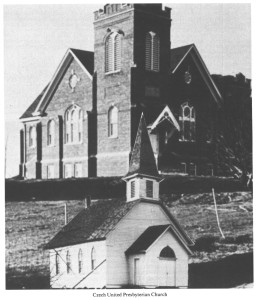 |
| Czech United Presbyterian Church |
page 61
|

